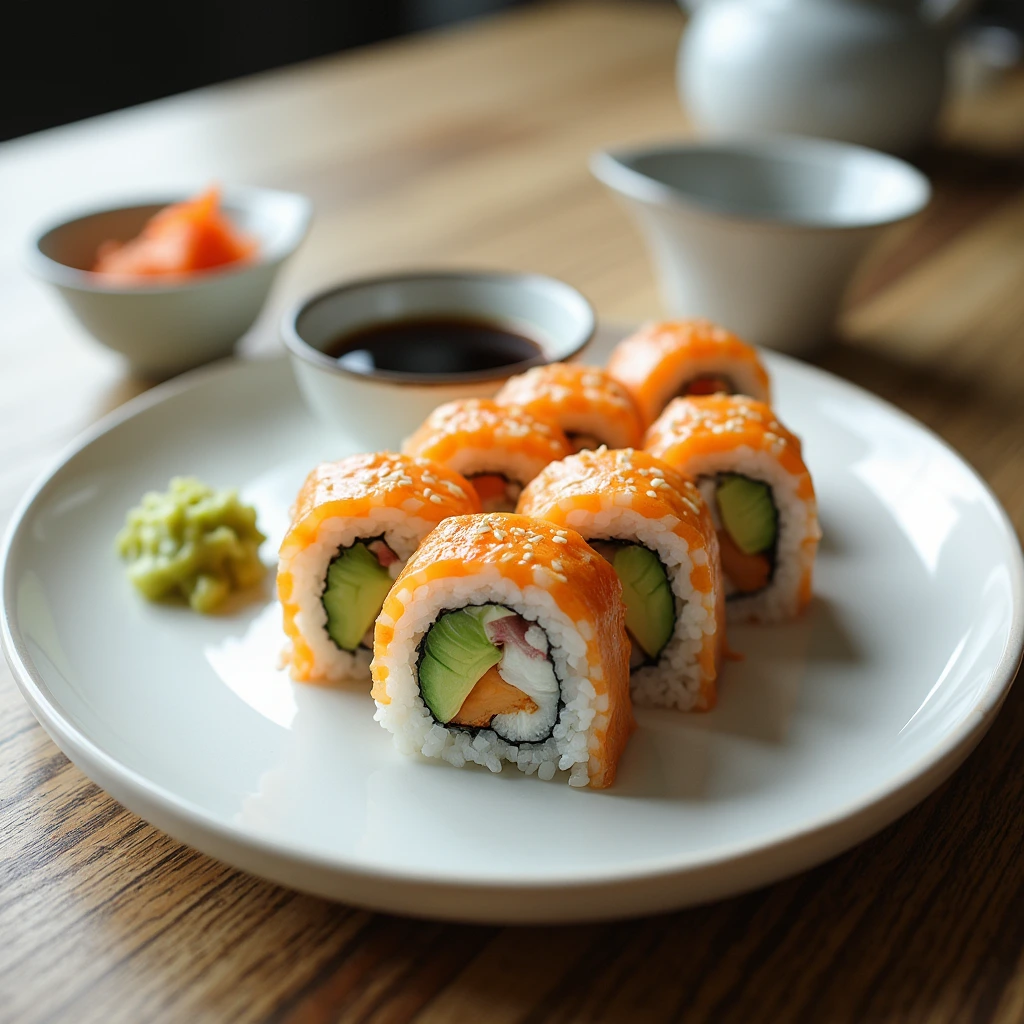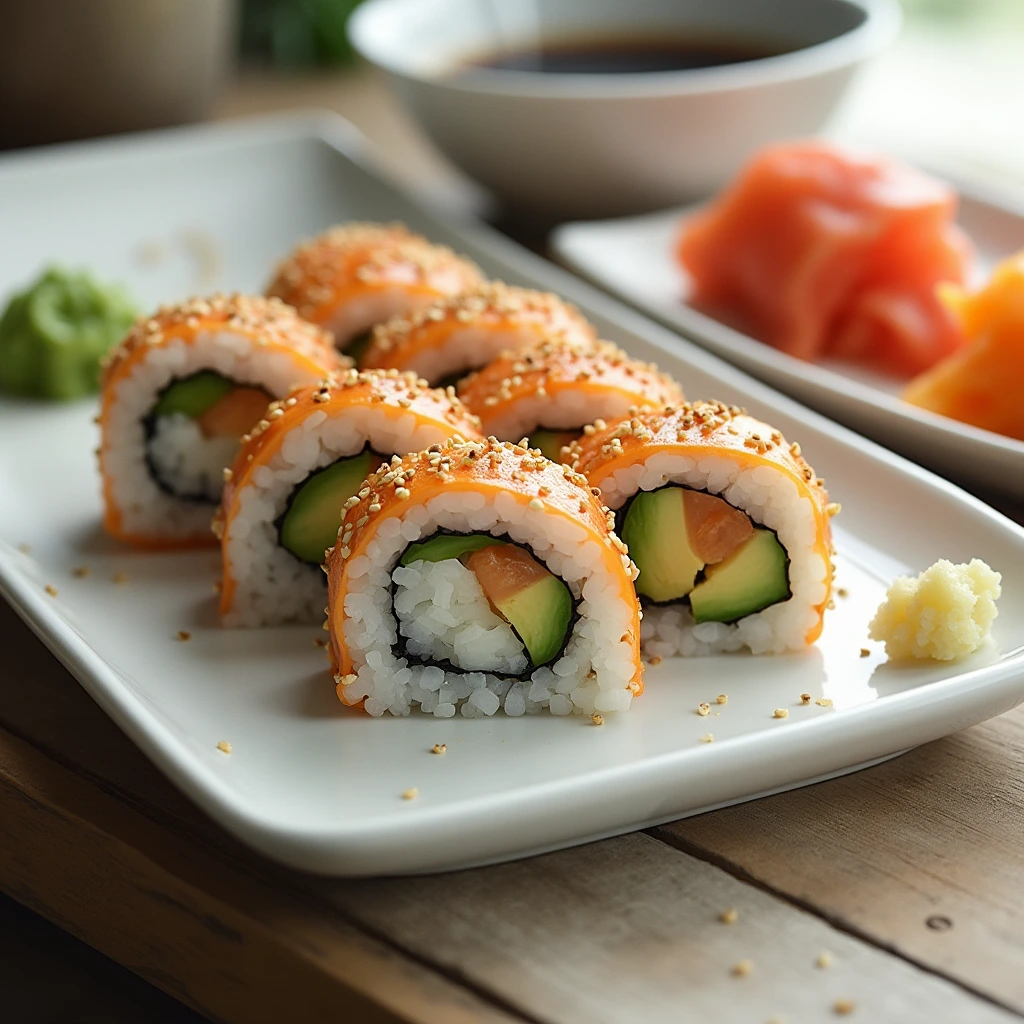The Boston Roll combines simple and tasty ingredients to create a delicious sushi option. Chefs in the United States invented this roll as a creative twist on traditional Japanese sushi. It usually includes cooked shrimp, creamy avocado, and crisp cucumber, all wrapped in seasoned rice and seaweed (nori). Sesame seeds or tiny fish eggs (tobiko) often top the roll, adding extra flavor and visual appeal.
Its use of cooked shrimp instead of raw fish makes the Boston Roll a great choice for people new to sushi. Its fresh and light taste attracts fans in sushi spots across the U.S. and other countries. People love it for its straightforward flavors and attractive presentation. Whether you enjoy it as part of a meal or on its own, the Boston Roll offers a tasty way to explore the world of sushi.

The Origins of the Boston Roll
The Boston Roll began in the United States, where sushi chefs adapted traditional Japanese recipes to suit American tastes. These chefs created the roll using cooked shrimp instead of raw fish, appealing to diners who were less familiar with raw seafood.
The roll takes its name from Boston because of the region’s strong connection to fresh seafood, particularly shrimp. Boston and its surrounding areas boast a thriving fishing industry, inspiring the use of shrimp as a key ingredient. By adding this local touch, chefs crafted a dish that felt familiar while preserving the essence of sushi.
This innovation not only broadened sushi’s appeal but also introduced many Americans to Japanese cuisine. Over time, sushi restaurants across the country embraced the Boston Roll for its approachable flavors and ties to local culinary traditions. The name celebrates the region’s seafood heritage, turning the roll into a delicious symbol of cross-cultural creativity.
Ingredients in a Boston Roll
The Boston Roll brings together a delightful mix of fresh and flavorful ingredients. Each component plays a key role in creating the roll’s unique taste and texture, making it a beloved choice among sushi enthusiasts.
- Shrimp: At the heart of the Boston Roll is cooked shrimp, which provides a sweet and savory flavor. Furthermore, its tender texture pairs perfectly with the other ingredients.
- Cucumber: Thin slices of cucumber contribute a refreshing crunch. In addition, they balance the richness of the shrimp and avocado, adding a light and crisp element to each bite.
- Avocado: Creamy avocado enhances the roll with its smooth and buttery texture. Moreover, its mild flavor blends seamlessly with the other ingredients.
- Sushi Rice: Seasoned sushi rice acts as the base of the roll. Specifically, the tangy blend of rice vinegar, sugar, and salt highlights and complements the flavors of the filling.
- Seaweed (Nori): A sheet of nori holds everything together. Additionally, it adds a subtle umami flavor that enhances the overall taste.
- Sesame Seeds: Finally, a sprinkle of sesame seeds on top adds a nutty aroma and crunch. As a finishing touch, they provide visual appeal and elevate the roll’s flavor profile.
Key Ingredient Spotlight
The Boston Roll shines because of its thoughtful combination of ingredients, with cooked shrimp, cucumber, and avocado playing key roles in its appeal.
Shrimp is the star of the roll, offering a sweet, savory flavor and a tender texture that defines the dish. Unlike many traditional sushi rolls that use raw fish, the Boston Roll opts for cooked shrimp, making it a great choice for those new to sushi or who prefer cooked seafood. The shrimp is typically boiled or steamed to preserve its natural flavor while ensuring a juicy and satisfying bite.
Cucumber adds a refreshing crunch that contrasts beautifully with the softness of the shrimp and avocado. Its light, watery taste balances the richer ingredients, ensuring the roll remains fresh and not overly heavy.
Avocado complements the shrimp and cucumber with its creamy and buttery texture. It enhances the overall flavor, adding a smooth element that brings all the components together. Avocado’s mild taste ensures it blends harmoniously, contributing richness without overpowering the dish.
Together, these three ingredients create a balanced mix of textures and flavors, making the Boston Roll a favorite for its light, fresh, and approachable taste.
How a Boston Roll Differs from Other Sushi Rolls
The Boston Roll sets itself apart from traditional sushi rolls with its use of cooked shrimp and its balance of simple, fresh flavors. While many sushi rolls rely on raw fish, the Boston Roll opts for fully cooked shrimp, making it a more approachable choice for those hesitant about raw seafood.
Compared to the California Roll, which features imitation crab, avocado, and cucumber, the Boston Roll uses cooked shrimp as its protein. Both rolls offer mild and creamy flavors, but the Boston Roll’s shrimp provides a natural sweetness that distinguishes it.
In contrast, the Philadelphia Roll incorporates smoked salmon, cream cheese, and cucumber. While the Philadelphia Roll emphasizes a rich and creamy profile, the Boston Roll focuses on lightness, with the avocado and cucumber complementing the shrimp’s tender texture.
The Spicy Tuna Roll showcases raw tuna mixed with a spicy sauce, offering bold, fiery flavors. The Boston Roll, however, stays mild and refreshing, catering to those who prefer a subtler taste.
Ultimately, the Boston Roll stands out for its use of cooked shrimp, making it a great choice for sushi lovers seeking a dish that balances familiar flavors with a touch of elegance.
Health Benefits of a Boston Roll
The Boston Roll is not only tasty but also offers a range of health benefits. Its ingredients provide a mix of protein, healthy fats, and fiber, making it a smart choice for many.
Shrimp, the main protein, is low in calories and full of nutrients like iodine, selenium, and vitamin B12. It’s a lean source of protein that helps build muscles and supports a healthy metabolism.
Avocado adds healthy fats that are good for the heart. These fats can help lower bad cholesterol and reduce the risk of heart disease. Avocado is also rich in vitamins like E, K, and C, as well as potassium, which is important for muscles and heart health.
Cucumber is a refreshing, low-calorie vegetable that provides fiber and supports digestion. Its high water content also helps keep you hydrated.
Sushi rice, while higher in carbs, provides energy. Combined with the fiber and protein in the roll, it makes for a balanced meal.
Because it uses cooked shrimp instead of raw fish, the Boston Roll is a good choice for people who prefer cooked seafood or have dietary restrictions. Its simple, nutritious ingredients make it a healthy option for sushi fans.
How to Make a Boston Roll at Home
Making a Boston Roll at home is easier than you might think. With the right ingredients and a bit of practice, you can enjoy fresh, homemade sushi.
Ingredients:
- Cooked shrimp (peeled and deveined)
- Sushi rice (prepared with rice vinegar, sugar, and salt)
- Nori (seaweed sheets)
- Avocado (sliced)
- Cucumber (julienned)
- Sesame seeds (optional)
Step-by-Step Guide:
- Prepare the ingredients: Cook and season the sushi rice. Slice the avocado and cucumber into thin strips.
- Set up your station: Place a bamboo sushi mat on a flat surface. Cover it with plastic wrap to prevent sticking.
- Assemble the roll: Lay a sheet of nori shiny side down on the mat. Spread an even layer of rice over the nori, leaving a small border at the top. Sprinkle sesame seeds if desired.
- Add the filling: Place shrimp, avocado, and cucumber in a line near the bottom edge of the nori.
- Roll the sushi: Use the mat to tightly roll the sushi from the bottom, pressing gently to seal the edges.
- Cut and serve: Slice the roll into bite-sized pieces with a sharp, wet knife. Arrange on a plate for a neat presentation.
Enjoy your Boston Roll with soy sauce, pickled ginger, or wasabi for added flavor!
Tools Needed
To make a Boston Roll at home, you’ll need a few essential tools. With the right equipment, the process becomes much easier and more enjoyable.
- Sushi Mat (Makisu): A bamboo sushi mat is essential for rolling the sushi tightly and evenly. Furthermore, covering it with plastic wrap prevents sticking and simplifies cleanup.
- Sharp Knife: A sharp knife is crucial for cutting clean slices without crushing the roll. Additionally, wetting the blade with water between cuts helps create smooth, even pieces.
- Cutting Board: A sturdy cutting board provides a stable surface for slicing your roll. It also keeps your workspace clean and protects your countertops.
- Rice Paddle or Spoon: This tool helps you spread the seasoned sushi rice evenly on the nori. Moreover, it prevents the rice from sticking to your hands.
- Mixing Bowl: You’ll need a bowl to mix and season the sushi rice. In addition, it’s useful for keeping the rice warm and manageable.
- Measuring Tools: Measuring cups and spoons ensure you use the right amounts of vinegar, sugar, and salt for perfectly seasoned rice.
With these tools, you’ll have everything needed to create a well-made and delicious Boston Roll.
Where to Find the Best Boston Rolls
The Boston Roll has become a staple in sushi restaurants across the United States, with many places offering their unique twist on this classic roll. While it’s widely available, certain regions and establishments are known for serving some of the best Boston Rolls.
Popular Restaurants and Sushi Bars:
- Coastal Sushi Bars: In cities like Boston, New York, and Seattle, sushi bars often showcase the Boston Roll as a nod to the region’s love for seafood. Restaurants such as Oishii Boston and Sushi Yasuda are renowned for their fresh and flavorful rolls.
- Modern Sushi Chains: Nationwide chains like RA Sushi and Sushi Roku frequently include Boston Rolls on their menus, offering a reliable option for sushi lovers.
Regions of Popularity:
- New England: Unsurprisingly, the roll is especially popular in the Boston area, where its seafood heritage resonates strongly.
- West Coast: Cities like Los Angeles and San Francisco, known for their vibrant sushi scenes, often highlight the Boston Roll alongside other creative sushi options.
- Suburban Sushi Spots: Many local sushi bars across the U.S. serve this approachable roll, making it a favorite for casual diners.
For the freshest and most authentic experience, seek out sushi restaurants with high-quality ingredients and a focus on traditional preparation techniques.
Variations of the Boston Roll
The Boston Roll has inspired several creative variations, offering something for every palate. These unique spins incorporate bold flavors, textures, and dietary adaptations while keeping the essence of the original roll.
Spicy Boston Roll:
For those who enjoy a kick of heat, the spicy Boston roll adds a layer of spicy mayo or sriracha to the shrimp. Some versions also mix the shrimp with spicy seasonings, creating a zesty flavor profile that complements the creamy avocado and crisp cucumber.
Tempura Boston Roll:
This variation takes the roll to the next level by deep-frying it in a light tempura batter. The crispy exterior adds a delightful crunch that contrasts with the soft rice and filling. Often, this version is drizzled with eel sauce or spicy mayo for added richness.
Vegan Boston Roll:
For plant-based diners, a vegan version replaces shrimp with marinated tofu, grilled mushrooms, or seasoned jackfruit. These substitutes mimic the texture and flavor of shrimp while keeping the roll entirely vegan. The avocado, cucumber, and rice remain staples, ensuring a familiar yet innovative take.
These variations showcase the versatility of the Boston Roll, allowing sushi enthusiasts to explore new tastes while enjoying the roll’s classic appeal.
FAQs
What is a Boston Roll made of?
A Boston Roll is made with cooked shrimp, avocado, and cucumber, wrapped in sushi rice and nori (seaweed). It’s often topped with sesame seeds or tobiko (fish roe) for added flavor and visual appeal.
What is the difference between a Boston Roll and a Philadelphia Roll?
The main difference lies in the ingredients. A Boston Roll uses cooked shrimp, while a Philadelphia Roll features smoked salmon and cream cheese. Additionally, the Boston Roll emphasizes fresh and light flavors, whereas the Philadelphia Roll has a richer, creamier taste.
Does a Boston Roll have cream cheese?
No, a traditional Boston Roll does not include cream cheese. Instead, it relies on the combination of shrimp, avocado, and cucumber for its flavor and texture.
Is the Boston Roll good?
Yes! The Boston Roll is widely appreciated for its simple, fresh flavors and appealing texture. Its use of cooked shrimp makes it an excellent choice for sushi beginners or those who prefer cooked seafood over raw fish.
Let’s try it
The Boston Roll is a standout sushi option that combines delicious flavors, accessibility, and adaptability. Its use of cooked shrimp makes it a perfect choice for those new to sushi or who prefer cooked seafood, while the combination of creamy avocado and crisp cucumber creates a refreshing and satisfying bite.
This roll’s appeal goes beyond its taste—it’s approachable for a wide range of dietary preferences and offers a canvas for creativity, with variations like the spicy Boston roll, tempura versions, and vegan adaptations. Whether enjoyed at a high-end sushi restaurant, a local sushi bar, or made at home, the Boston Roll delivers a balance of flavors and textures that suit both casual diners and sushi aficionados.
In addition to its culinary appeal, the Boston Roll reflects the global influence of sushi culture, blending Japanese traditions with local flavors. This fusion not only broadens sushi’s reach but also makes it a beloved favorite in kitchens and restaurants worldwide.
Ultimately, the Boston Roll’s simplicity, adaptability, and delightful taste ensure it remains a cherished part of the sushi experience, welcoming everyone to enjoy the art and flavor of sushi.
More
For additional resources on Boston Rolls and sushi-related topics, the Boston Roll guide on Quickly Taste provides a thorough overview, including key ingredients and preparation tips. Another helpful resource is their article on Boston Roll Ingredients, which breaks down everything you need to recreate this roll at home.
To explore broader sushi recipes, the Salmon Sushi guide on the same site offers insights into traditional sushi-making techniques. For a fun twist, their recipe for Tempura Variations provides ideas on adding crispy texture to your rolls.
Externally, the Just One Cookbook website is an excellent resource for learning authentic Japanese recipes, including sushi rolls. Their guide on making sushi rice is especially useful for perfecting the foundation of any roll. Another great resource is The Sushi FAQ, which dives into sushi history, types, and step-by-step guides for beginners.
For visual learners, YouTube channels like Cooking with Dog offer easy-to-follow sushi tutorials. Additionally, online platforms like MasterClass provide in-depth courses taught by world-renowned chefs, ensuring you have all the tools to master sushi-making, including the beloved Boston Roll.

